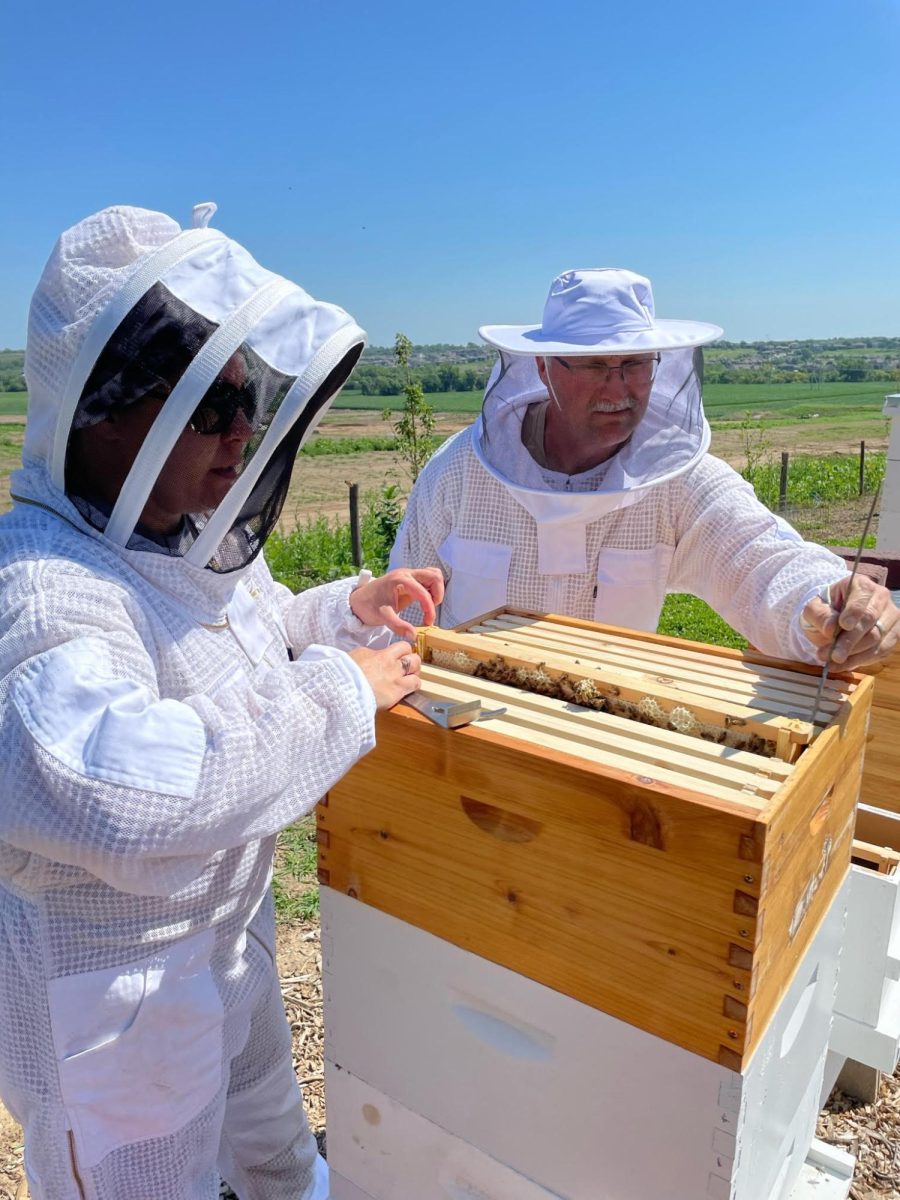For many, the buzzing of bees provokes strong reactions of fear and nervousness. However, science teacher Heather Bieber is appreciative of the unique roles our small friends play.
“I’m a biology teacher, and I also teach Environmental Science. I’m really passionate about our pollinators,” Bieber said. “I keep bees…mostly for honey and pollination.”
Bieber became interested in beekeeping two years ago when she desired to get fresher honey. Already a gardener, Bieber looked online to investigate how she could learn the art of beekeeping.
“I really thought it would be nice to get honey from my own bees,” Bieber said. “I looked into whether there’s anywhere in the Omaha Metro that offers bee courses, and I took one through the Omaha Bee Club.”
The Omaha Bee Club is a nonprofit organization that specializes in educating its members on bees and training them on how to keep them. Aspiring beekeepers can take an introductory course, and stay connected with the community later.
“This is my third season. I took a bee class with the Omaha Bee Club, with two other teachers. We learned how to become beekeepers and got our own bees,” Bieber said.
Retired physics teacher Walt Mertz and fellow science teacher Sharon Eblen have assisted Bieber since the beginning, taking courses with her and keeping the bees.
“I was first interested in keeping bees a few years ago because I noticed a lack of pollinators for my garden and fruit trees,” Mertz said. “After a bit of googling, it turns out there is an Omaha Bee Club whose mission is to educate and mentor new beekeepers.”
Mertz, intrigued, joined the Omaha Bee Club and became fascinated.
“One of the Omaha Bee Club suggestions was to work with a mentor…Mrs. Eblen and I decided to be each other’s mentor and learn this together,” Mertz said. “It worked out great!”
Eblen immediately was hooked on the idea of beekeeping.
“He said he was going to try it and asked if I was interested,” Eblen said. “So we went and took some classes with Mrs. Bieber and teamed up on a friends-working kind of thing.”
Eblen also, like Mertz, was concerned about the declining number of honeybees and the effect that it may have on the environment.
“I wanted to promote pollinators in the community, and there were big articles about the honey bee population decreasing,” Eblen said.
It’s true that the honeybee population, essential to the growth of many species of plants, has generally been on the decline since the 1990s. While the population is starting to make a comeback, the number is still well below where it was at its peak.
After receiving their certificates and obtaining their bees, the teachers got to work. The first necessity was to find a place to keep them. Bees need good shelter, as well as a dependable water source and many sources of pollen. Fortunately, Mertz had the perfect place in mind.
“We recently attained a lot next to our house that was farmland the previous year,” Mertz said. “We planted a lot of Dutch White Clover that would be great for bees and to help hold in soil once established the clover tends to choke out other less desirable weeds. We also started working on establishing prairie grasses and flowers which helps out the honeybees, native bees, and other pollinators.”
The actual keeping of the bees came next. While many might find interaction with bees terrifying, Eblen thinks that they aren’t as scary as one might initially dismiss them to be.
“It depends on the time of year. Early in the spring, I can just reach in with my bare hands because they’re surprisingly chill,” Eblen said.
That’s not to say that beekeeping is a no-risk endeavor, however.
“As the summer goes on and they have more and more honey stored up, they get more possessive,” Eblen said. “Sometimes they thump you or run into you and try to scare you away. I had one bad day where I got stung a lot.”
This doesn’t deter the teachers from continuing to work with bees, however. Bieber, Eblen, and Mertz, continue to work while excitedly looking forward to the future.
“It’s a really interesting hobby,” Eblen said. “Bees are a lot more complex and social [than we think]. They’re really fascinating creatures.”
The teachers, in the end, continue to learn more about these remarkable insects while continuing to help their ecosystem. With a little enthusiasm, even just a small interest can go a long way into picking up a quirky hobby and making a difference, discovering new and exciting things during the journey.


